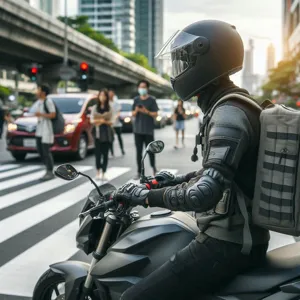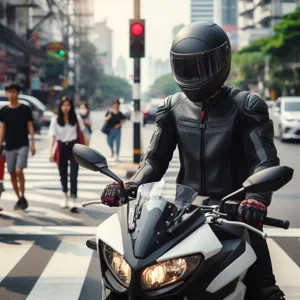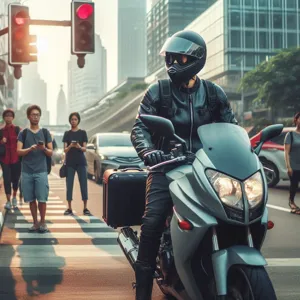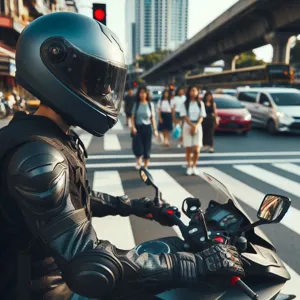As the roar of a motorcycle engine cuts through the air and the open road beckons, the thrill of riding can be both exhilarating and liberating.
However, with this freedom comes a set of ethical considerations that every motorcyclist must navigate. From environmental impact and road safety to the responsibility of sharing the road with others, the choices we make as riders hold significant weight. In this blog post, we will explore the multifaceted ethical landscape of motorcycle use, examining the balance between personal enjoyment and communal responsibility. Whether you’re a seasoned rider or a newcomer to the world of motorcycles, understanding these considerations will not only enhance your riding experience but also contribute to a safer and more respectful riding community. Join us as we delve into the principles of responsible motorcycling and discover how we can all ride right.
1. Introduction to Motorcycle Ethics

Motorcycling is more than just a mode of transportation; it is a lifestyle that invokes a sense of freedom, adventure, and community. However, as with any passionate pursuit, it comes with a set of ethical considerations that riders must navigate to ensure their actions align with the values of safety, respect, and responsibility. The open road beckons, but it also demands a thoughtful approach to how we engage with it and those around us.
At its core, motorcycle ethics encompasses a variety of topics, from environmental impact to community relations, and personal safety to legal compliance. As motorcycle enthusiasts, we must reflect on our choices and their repercussions not just for ourselves, but for fellow road users, pedestrians, and the environment. This introduction sets the stage for a deeper exploration of ethical riding practices, encouraging riders to think critically about their role within the broader tapestry of motorcycle culture.
Whether you’re a seasoned rider or someone considering entering the world of motorcycles, understanding the ethical dimensions of this activity is crucial. By examining the implications of our riding habits, we can foster a safer, more respectful community that honors the spirit of the ride while recognizing our responsibilities. Join us as we delve into these essential considerations, ensuring that the joy of riding is complemented by a commitment to ethical practices on the road.
2. The Environmental Impact of Motorcycling
When it comes to the open road, the thrill of riding a motorcycle is undeniable. However, as with any mode of transportation, it’s essential to consider the environmental impact that accompanies this exhilarating experience. Motorcycles are often viewed as a more efficient alternative to cars, boasting better fuel economy and a smaller physical footprint on the roads. Yet, the reality is more complex.
First, let’s delve into emissions. While many modern motorcycles are designed to be more eco-friendly, older models may still release significant amounts of carbon dioxide and other pollutants into the atmosphere. The type of fuel used can also play a role; high-octane fuels can produce more emissions than alternative options. As riders, we have a responsibility to choose vehicles that prioritize sustainability, whether that means opting for newer, cleaner models or even exploring electric motorcycles that produce zero emissions.
Next, there’s the issue of noise pollution. Motorcycles are often louder than their four-wheeled counterparts, contributing to noise pollution in residential areas and natural landscapes. The roar of a motorcycle can disturb wildlife and disrupt the tranquility of nature, leading to concerns about the preservation of ecosystems. As responsible riders, we should strive for a balance between enjoying the rush of the ride and being considerate of our surroundings. This might involve modifying our riding habits, such as choosing quieter routes or being mindful of our speed in noise-sensitive areas.
Furthermore, the environmental effects extend beyond emissions and noise. The production and maintenance of motorcycles involve resource extraction, manufacturing processes, and waste generation. From mining for metals to producing tires that eventually end up in landfills, every aspect of motorcycle use has an ecological footprint. Riders can mitigate their impact by maintaining their bikes properly to improve fuel efficiency, recycling old parts, and supporting manufacturers that prioritize sustainable practices.
In summary, while the freedom of the open road is a cherished part of motorcycle culture, we must acknowledge and address the environmental implications of our passion. By making informed choices and adopting eco-conscious practices, we can enjoy the thrill of motorcycling while also being stewards of the planet, ensuring that future generations can share in the joy of riding.
3. Safety and Responsibility on the Road

When it comes to motorcycle riding, safety and responsibility should always be your top priorities. Unlike cars, motorcycles expose riders to the elements and leave them vulnerable on the road, making it crucial to adopt a proactive approach to safety. This means not only equipping yourself with high-quality protective gear—such as helmets, gloves, jackets, and boots—but also ensuring that your motorcycle is in optimal condition. Regular maintenance checks can prevent mechanical failures that could lead to dangerous situations.
However, safety extends beyond personal protection and mechanical reliability. It encompasses a deep sense of responsibility towards other road users as well. Motorcyclists must be vigilant and aware of their surroundings, using defensive riding techniques to anticipate potential hazards. This includes maintaining a safe distance from vehicles, signaling intentions clearly, and being especially cautious at intersections where accidents are more likely to occur.
Moreover, understanding and adhering to local traffic laws is essential. Riding responsibly means respecting speed limits, avoiding aggressive maneuvers, and refraining from riding under the influence of alcohol or drugs. By doing so, you not only ensure your own safety but also contribute to the overall safety of the roadways.
Being a responsible motorcyclist also means advocating for safety awareness within the community. Engaging in or supporting local safety courses, participating in awareness campaigns, and sharing tips with fellow riders can create a culture of safety that benefits everyone. Ultimately, riding with safety and responsibility in mind makes for a more enjoyable experience and helps to build a positive reputation for motorcyclists in the broader community.
4. The Importance of Wearing Protective Gear
When it comes to motorcycle riding, the thrill of the open road is often matched only by the potential risks involved. One of the most critical ethical considerations for any rider is the importance of wearing protective gear. This isn’t just about personal safety; it’s also about responsibility to yourself and to others on the road.
Motorcycle accidents can happen in the blink of an eye, and the consequences can be severe. Protective gear serves as your first line of defense against the elements and, more importantly, against injuries. A high-quality helmet can drastically reduce the risk of head injuries, while jackets made from abrasion-resistant materials can protect your skin in case of a fall. Gloves, boots, and padded pants are equally vital, providing added protection to vulnerable areas of your body.
Investing in proper gear is an ethical imperative; it reflects your commitment to safe riding practices and acknowledges the risks inherent in motorcycling. By wearing protective gear, you send a message to other road users that you take safety seriously, fostering a culture of responsibility among fellow riders and motorists alike. Furthermore, being properly equipped can reduce the strain on emergency services and healthcare systems, as fewer injuries translate to fewer accidents needing urgent care.
Beyond your personal safety, consider the broader implications of your choices. A rider without protective gear not only risks their own wellbeing but might also burden their loved ones and the community with the consequences of preventable injuries. In this light, wearing protective gear is not merely a personal choice; it’s a moral obligation to safeguard your life and minimize the impact on those around you.
In conclusion, prioritizing protective gear is essential for any motorcycle rider. It enhances your safety, exemplifies your commitment to responsible riding, and contributes to a culture of awareness and accountability on the road. So the next time you gear up for a ride, remember: it’s not just about looking cool; it’s about riding right and riding safe.
5. Community and Culture: The Motorcycle Brotherhood

The world of motorcycling extends far beyond the thrill of the ride; it encompasses a rich tapestry of community and culture that has evolved over decades. When you don a helmet and twist the throttle, you’re not just embarking on a journey; you’re entering a brotherhood—an intricate network of riders who share a common passion and ethos that transcends geographic and social boundaries.
At its core, the motorcycle brotherhood is built on principles of camaraderie, respect, and mutual support. Whether you ride a sleek sportbike, a rugged cruiser, or a vintage classic, the bond among riders is palpable. This sense of belonging is cultivated at bike meets, rallies, and group rides, where enthusiasts come together to celebrate their shared love for two wheels. These gatherings foster friendships and connections that often last a lifetime, creating a global community that feels more like family.
Moreover, the culture surrounding motorcycling is steeped in history and tradition. From the iconic leather jackets adorned with patches to the unmistakable roar of an engine, every element speaks to a legacy of freedom and rebellion. Riders often adopt codes of conduct—whether it’s the simple gesture of a wave to fellow bikers on the road or the unspoken rule to assist a stranded rider—that reinforce the sense of unity within the community. This unwritten code shapes the very fabric of motorcycle culture, emphasizing accountability and the importance of looking out for one another.
However, the brotherhood also comes with ethical considerations. The very act of riding can impact public perception, and it’s essential for riders to embody values such as safety, responsibility, and respect for the environment. Advocating for safe riding practices, wearing proper gear, and promoting awareness among non-riders can help bridge the gap between the motorcycle community and the broader public. By demonstrating that motorcyclists are responsible and conscientious, we can work towards dismantling stereotypes and fostering a positive image for all riders.
In essence, the motorcycle brotherhood is not just about the vehicles we ride; it’s about the relationships we build and the values we uphold. By navigating this culture with integrity and respect, we can ensure that the spirit of community thrives, making the world of motorcycling a welcoming place for all who wish to join the ride.
6. Navigating Noise Pollution Concerns
As the roar of motorcycle engines cuts through the serene backdrop of nature or bustling urban landscapes, it becomes increasingly clear that noise pollution is a pressing concern associated with motorcycle use. While the thrill of riding is amplified by the sound of revving engines, the disruption it causes to both the environment and local communities cannot be overlooked.
Motorcycle enthusiasts often cherish the freedom and exhilaration that comes with hitting the open road, but with that freedom comes a responsibility to be mindful of noise levels. Many cities and towns have implemented regulations to curb excessive noise, leading to heated debates among riders and residents. It’s essential for riders to educate themselves on local noise ordinances and to adopt practices that mitigate their impact on the surroundings.
Investing in aftermarket mufflers or sound-dampening technologies can significantly reduce the noise produced by your motorcycle, allowing riders to enjoy their passion without disrupting others. Additionally, choosing quieter routes—such as less populated roads or scenic byways—can enhance the riding experience while minimizing the disturbance to wildlife and residential areas.
Engaging with local communities can also foster goodwill and demonstrate a commitment to being a responsible rider. By participating in community events or advocacy for noise reduction initiatives, motorcycle riders can contribute positively to the dialogue surrounding noise pollution while promoting a more harmonious coexistence with non-riders.
Ultimately, navigating noise pollution concerns is about striking a balance. It’s about enjoying the ride while respecting the peace and tranquility that others cherish. By making conscious choices and embracing a culture of responsibility, motorcyclists can ensure that their love for riding does not come at the expense of the communities and environments they traverse.
7. Ethical Considerations in Motorcycle Ownership

Motorcycle ownership comes with a unique set of ethical considerations that extend beyond the joy of riding and the thrill of the open road. As a motorcycle owner, it’s essential to reflect on how your choices impact not just your experience, but also the community around you and the environment.
One of the primary ethical dilemmas revolves around safety. Motorcyclists are often seen as more vulnerable on the road, which necessitates a commitment to responsible riding. This means not only wearing appropriate safety gear—such as helmets, jackets, gloves, and boots—but also adhering to traffic laws and being mindful of other road users. The duty to ride responsibly extends to making conscious decisions about speed and behavior, as reckless riding can jeopardize not only your safety but also that of others.
Moreover, the environmental impact of motorcycle ownership cannot be overlooked. While motorcycles generally consume less fuel than cars, contributing to lower greenhouse gas emissions, they still produce noise pollution and emissions that can harm air quality. As an ethical rider, consider the type of motorcycle you own: opting for models with better fuel efficiency or those that meet stringent emission standards can significantly reduce your ecological footprint. Additionally, explore options for eco-friendly riding gear and maintenance practices that minimize environmental harm.
Another aspect to consider is community engagement. Supporting local motorcycle clubs and participating in community events can foster camaraderie among riders while also promoting safer riding practices. However, it’s equally important to acknowledge the negative stereotypes that sometimes accompany motorcyclists and to actively work against them by engaging positively with the public. This can include participating in charity rides, hosting safety workshops, or simply being courteous and respectful on the roads.
In summary, ethical motorcycle ownership encompasses a wide range of responsibilities, from ensuring personal and public safety to making environmentally conscious choices and positively representing the riding community. By being aware of these considerations, you can enjoy the freedom of motorcycle riding while also contributing to a safer, more respectful, and sustainable environment for all.
8. The Role of Motorcycling in Urban Transportation
Motorcycling has increasingly become a vital player in the landscape of urban transportation, offering a unique blend of efficiency, accessibility, and environmental benefits that traditional vehicles often lack. As cities grapple with congestion, pollution, and the demand for sustainable transport solutions, motorcycles present an attractive alternative. Their smaller footprint allows them to navigate through tight spaces and heavy traffic, making them a practical choice for commuters seeking to shave minutes off their daily journeys.
In urban environments where parking is a premium, motorcycles shine once again. With their compact size, riders can easily find parking in crowded city centers, reducing the time spent searching for a spot and contributing to a more fluid traffic flow. This not only alleviates some of the strain on urban infrastructures but also encourages more individuals to consider two-wheeled transport as a viable option.
Additionally, motorcycling can serve as a greener alternative to traditional cars. Motorcycles generally consume less fuel and emit fewer greenhouse gases, which aligns with the growing push for sustainable urban living. Many modern motorcycles are designed with eco-friendly technologies, further enhancing their appeal as a responsible transportation choice.
However, as we embrace the role of motorcycling in urban transportation, we must also consider the ethical implications. Safety is paramount; urban riders face unique challenges, from navigating through dense traffic to sharing the road with larger vehicles. Advocating for proper training, protective gear, and awareness campaigns is essential to ensure that both motorcyclists and other road users can coexist safely and responsibly.
In essence, the role of motorcycling in urban transportation is multifaceted. It addresses pressing issues like traffic congestion and environmental sustainability while also presenting challenges regarding safety and public perception. As cities evolve, so too must our understanding of how motorcycles fit into the broader transportation ecosystem, ensuring that their integration is both ethical and beneficial for all.
9. Advocacy for Responsible Riding Practices
Advocacy for responsible riding practices is not just a trend; it’s a vital movement aimed at preserving the joy of motorcycling for generations to come. As motorcycle enthusiasts, we have a unique responsibility to promote safety, respect for the environment, and a sense of community among riders. Responsible riding begins with acknowledging the impact of our choices on ourselves, other road users, and the world around us.
One of the most effective ways to advocate for responsible riding is through education and awareness campaigns. These can encompass a variety of initiatives, from local workshops on safe riding techniques to community rides that emphasize the importance of wearing proper gear and obeying traffic laws. By sharing our experiences and knowledge, we can help foster a culture that values safety and mindfulness on the road.
Moreover, we must address environmental concerns associated with motorcycle use. This includes promoting eco-friendly riding practices, such as maintaining our bikes to reduce emissions and considering fuel efficiency when choosing models. Supporting local initiatives that advocate for cleaner roads and less congested traffic can also make a significant impact.
Additionally, it’s essential to build a sense of camaraderie within the riding community. Encouraging fellow riders to look out for one another can lead to safer riding environments. Whether it’s through organized group rides that emphasize safe practices or informal meetups where riders can share tips and experiences, fostering a supportive network strengthens the commitment to responsible riding.
Ultimately, advocacy for responsible riding practices isn’t just about rules; it’s about creating a lifestyle that prioritizes safety, community, and environmental stewardship. By embracing these values, we contribute to a positive image of motorcyclists as conscientious road users, ensuring that the thrill of riding remains a cherished experience for all.
10. The Balance Between Freedom and Responsibility
When it comes to motorcycle riding, the exhilarating feeling of freedom is often one of the primary reasons why enthusiasts hit the open road. The wind in your hair, the roar of the engine, and the thrill of speed create a sense of liberation that few other activities can replicate. However, with this exhilarating freedom comes a profound responsibility—both to oneself and to the broader community. Striking a balance between these two aspects is crucial for ensuring a safe and enjoyable riding experience.
As motorcyclists, we revel in our ability to navigate through traffic and explore the world at our own pace. But this sense of autonomy must be tempered with a commitment to safety. Riders need to be acutely aware of road conditions, the behavior of other vehicles, and their own skill levels. Wearing appropriate gear—such as helmets, jackets, and gloves—should never be seen as a limitation on freedom, but rather as an essential safeguard that allows for the continuation of that freedom.
Moreover, ethical considerations extend beyond personal safety; they encompass the impact of our riding on others. Being a responsible motorcyclist means adhering to traffic regulations, respecting noise ordinances, and being considerate of the environment. Excessive speeding or reckless riding can endanger not only the rider but also pedestrians and other drivers. Engaging in community initiatives, such as motorcycle safety courses or outreach programs, can help foster a positive image of motorcyclists and promote safer riding practices.
Ultimately, the balance between freedom and responsibility is necessary for the sustainability of motorcycling culture. By embracing this duality, riders can enjoy the thrill of the ride while ensuring that they contribute positively to their communities. In doing so, they not only enhance their own experience but also pave the way for future generations of motorcyclists to enjoy the same freedoms. Riding is not just about the journey; it’s about being a conscientious member of the roadways we share.
11. Understanding the Legal Landscape for Motorcyclists
Navigating the legal landscape for motorcyclists is crucial for ensuring not only your safety but also your peace of mind on the road. Laws governing motorcycle use can vary significantly from one jurisdiction to another, and understanding these regulations can help you avoid unnecessary fines and legal troubles.
First and foremost, familiarize yourself with the licensing requirements in your area. Most places require motorcyclists to obtain a specific motorcycle endorsement on their driver’s license, which typically involves passing both a written exam and a road test. Ensuring you have the correct documentation not only keeps you compliant with the law but also demonstrates your commitment to safe riding practices.
In addition to licensing, it’s essential to be aware of the helmet laws that apply in your state. Some regions mandate the use of helmets for all riders, while others may only require them for certain age groups. Wearing an appropriate helmet is not just a legal obligation in many areas; it’s a critical safety measure that can significantly reduce the risk of head injuries in the event of an accident.
Insurance is another vital aspect of the legal landscape for motorcyclists. Many states require proof of insurance before you can legally operate your bike. Understanding the minimum coverage requirements and considering additional protection—such as liability, collision, and comprehensive coverage—can help safeguard your financial interests in case of an accident.
Moreover, familiarize yourself with local traffic laws that specifically pertain to motorcycles. This includes understanding lane splitting regulations, as some places allow it while others do not. Being aware of these laws can help you navigate traffic more effectively and reduce the risk of collisions.
Lastly, staying informed about ongoing discussions and changes in motorcycle-related legislation is essential. Advocacy groups often work to promote riders’ rights and improve safety regulations, and being engaged in these discussions can empower you as a motorcyclist. By understanding the legal landscape, you can ride confidently, knowing that you are both compliant and responsible, ultimately enhancing the overall motorcycle experience for yourself and those around you.
12. The Impact of Riding on Mental Health and Well-being
Motorcycling is much more than a mode of transportation; it’s an experience that can significantly impact mental health and overall well-being. The act of riding often instills a profound sense of freedom, allowing individuals to escape the confines of daily pressures and routine. As the wind rushes past, riders often describe a therapeutic effect—an exhilarating release that transcends the stresses of everyday life.
For many, the rhythmic hum of the engine and the open road serve as a form of mindfulness, drawing riders into the present moment. The focus required to navigate twists and turns fosters a sense of clarity and calm, while the adrenaline of speed can elevate mood and reduce anxiety. This unique blend of physical activity and cognitive engagement contributes to a boost in mental resilience, helping riders to cope with challenges both on and off the bike.
Moreover, the motorcycle community itself can play an integral role in supporting mental health. The camaraderie among riders fosters social connections, providing a sense of belonging and shared passion. Group rides and events create opportunities for social interaction, which can alleviate feelings of loneliness and isolation. Engaging with fellow enthusiasts can lead to meaningful friendships and support networks, further enhancing emotional well-being.
However, it’s important to consider the potential downsides. Riding can also introduce stressors, such as safety concerns and the pressure to maintain a certain image within the community. Balancing the thrill of riding with responsible practices, such as wearing proper gear and staying informed about safe riding techniques, is crucial to ensuring that the benefits outweigh the risks.
In summary, the impact of riding on mental health and well-being is multifaceted. While it offers an avenue for stress relief, community connection, and personal growth, riders must remain mindful of the potential challenges that accompany this exhilarating lifestyle. By embracing both the joys and responsibilities that come with motorcycling, individuals can truly harness the therapeutic benefits of the ride.
13. Promoting Inclusivity within the Motorcycle Community
Promoting inclusivity within the motorcycle community is not just a noble endeavor; it’s essential for the growth and enrichment of the culture itself. Historically, motorcycling has been perceived as a predominantly male, often exclusive domain. However, as the landscape evolves, embracing diversity and fostering a welcoming atmosphere for riders of all backgrounds has become increasingly important.
To cultivate a more inclusive community, it’s vital to start with representation. This means highlighting the voices and stories of women, people of color, LGBTQ+ riders, and individuals with disabilities. Organizations and motorcycle clubs can host events that celebrate diversity, such as group rides, workshops, or meet-ups that specifically invite underrepresented groups to share their experiences and connect with fellow enthusiasts. By creating spaces where everyone feels valued and included, we enrich the tapestry of the motorcycle community.
Education also plays a crucial role in promoting inclusivity. Offering beginner riding classes tailored for diverse groups can break down barriers and empower new riders to embrace their passion for motorcycling. Additionally, discussing the importance of respect and camaraderie among riders can help foster an environment where everyone feels safe and welcomed, regardless of their background.
Social media is another powerful tool in the quest for inclusivity. By amplifying diverse voices and celebrating the achievements of riders from various walks of life, the community can inspire others to join the fold. Highlighting stories of motorcycle journeys, adventures, and personal growth can create a sense of belonging and encourage more people to take up riding.
Ultimately, promoting inclusivity within the motorcycle community is about more than just numbers; it’s about creating a culture that celebrates individuality and shared passion. As we work together to break down barriers, we not only enrich our community but also pave the way for future generations of riders to experience the joy and freedom that comes with the open road. Riding is for everyone, and embracing this principle can lead to a stronger, more vibrant motorcycle culture for all.
14. Tips for Ethical Riding: Best Practices
When it comes to ethical riding, adopting best practices can significantly enhance not only your experience on the road but also the safety and enjoyment of others around you. Here are some essential tips to ensure that your passion for motorcycling harmonizes with responsible riding.
**1. Respect the Environment:** Always be conscious of the impact your riding has on the environment. Choose eco-friendly routes when possible, avoid riding in sensitive natural areas, and follow designated trails. Additionally, maintain your motorcycle properly to minimize emissions and noise pollution, contributing to a cleaner, quieter ride.
**2. Be Aware of Your Surroundings:** Ethical riding means being considerate of other road users, including pedestrians, cyclists, and fellow motorists. Always stay alert and maintain a safe distance from others. Use your turn signals and communicate your intentions clearly. This not only helps prevent accidents but also reinforces a spirit of camaraderie on the road.
**3. Follow Traffic Laws and Regulations:** Adhering to traffic laws is not just about avoiding fines; it’s about setting an example for others. Respect speed limits, traffic signals, and local regulations. Understanding and obeying the rules of the road is foundational to ethical riding.
**4. Engage in Community Initiatives:** Join local motorcycle groups that promote safe and responsible riding. Participate in community events that focus on motorcycle safety, education, and environmental stewardship. This not only strengthens your skills but also fosters community spirit and public awareness about responsible motorcycle use.
**5. Promote Safety Gear:** Wearing appropriate safety gear—helmets, jackets, gloves, and boots—should be non-negotiable. Encourage fellow riders to invest in protective equipment as well. By prioritizing safety, you contribute to a culture of responsibility and care within the motorcycle community.
**6. Share the Road:** As a motorcyclist, you share the road with various vehicles, each with its own challenges. Be courteous to drivers of cars, trucks, and buses, and never attempt to weave through traffic aggressively. Patience and courtesy foster a positive riding environment for everyone.
By integrating these ethical riding practices into your routine, you can enjoy the thrill of the open road while promoting a responsible and respectful motorcycle culture. Remember, every time you ride, you represent not just yourself but the entire motorcycling community. Let your actions reflect the values of safety, respect, and environmental consciousness that define ethical riding.
15. Conclusion: Embracing Ethical Motorcycling
As we conclude our exploration of the ethical considerations surrounding motorcycle use, it’s clear that embracing responsible motorcycling goes beyond simply enjoying the thrill of the ride. It involves a commitment to safety, respect for the environment, and consideration for the communities we traverse. Each time we mount our bikes, we hold the power to influence perceptions of motorcyclists and contribute to a culture of mutual respect on the road.
Ethical motorcycling means prioritizing safety, not only for ourselves but for all road users. Wearing appropriate gear, adhering to speed limits, and being vigilant about our surroundings can significantly reduce the risks associated with riding. Furthermore, being mindful of noise levels and emissions is essential in preserving the serenity of our natural landscapes and minimizing our environmental footprint.
Moreover, engaging with fellow riders and non-riders alike fosters a sense of community and shared responsibility. Whether it’s participating in local events, supporting motorcycle safety courses, or advocating for better infrastructure, we can all play a part in nurturing a positive image of motorcycling. By making conscious choices and encouraging others to do the same, we can create a culture that celebrates the freedom of the open road while honoring the shared spaces we all depend on.
In embracing ethical motorcycling, we not only enhance our own riding experiences but also contribute to a safer, more respectful, and environmentally conscious world for everyone who shares the road. Let’s ride with purpose, integrity, and a commitment to making a positive impact, ensuring that the joy of motorcycling continues for generations to come.
In conclusion, navigating the ethical considerations of motorcycle use requires a thoughtful approach that balances personal freedom with responsibility towards others and the environment. By embracing safe riding practices, respecting traffic laws, and considering the impact of our choices, we can foster a culture of respect and awareness within the motorcycling community. As you hit the open road, remember that every ride is an opportunity to exemplify the values of safety, sustainability, and camaraderie. Let’s ride right, not only for our own enjoyment but also for the well-being of our fellow road users and the world around us. Thank you for joining us on this journey; we hope it inspires you to ride with purpose and integrity.






